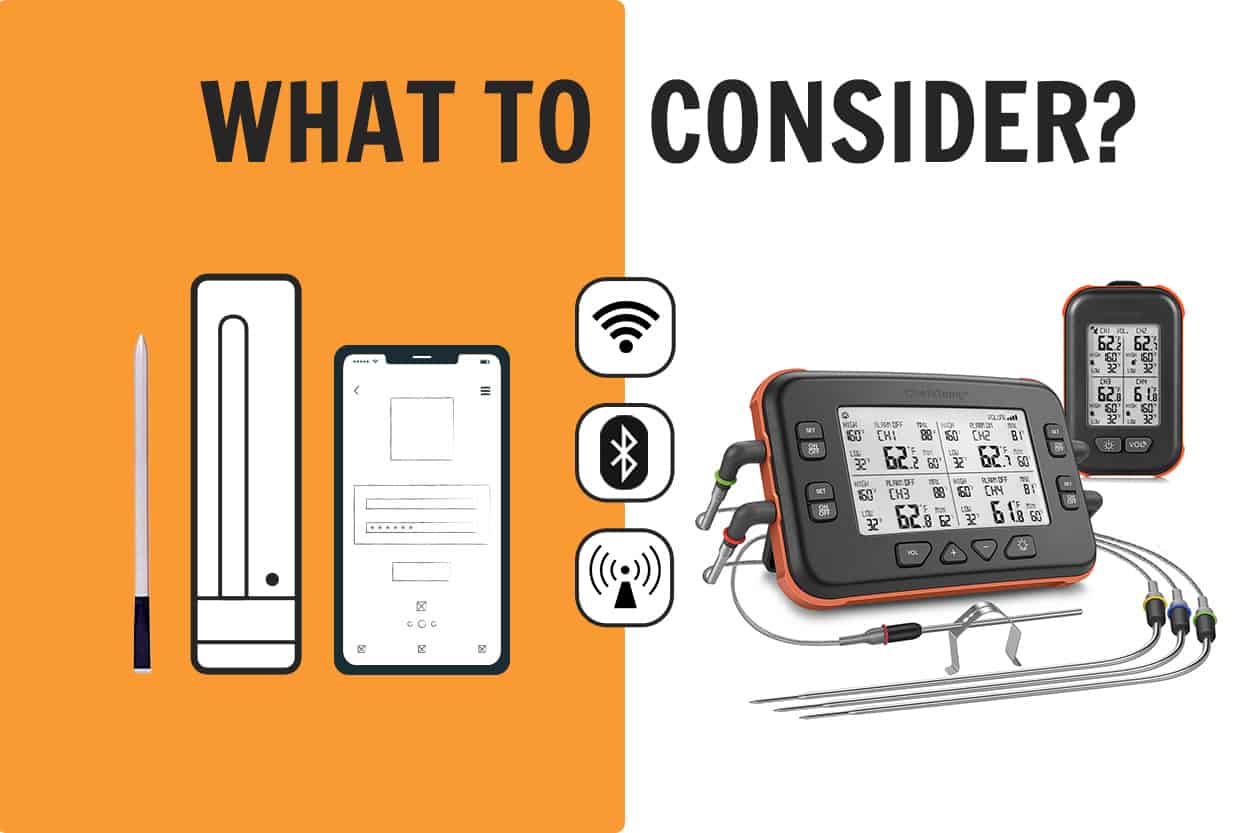
Everything you need to know when buying, or avoiding, Bluetooth meat thermometers
Bluetooth Thermometers, Modern Problems Require Reliable Solutions.
Meat thermometers have come a long way since the introduction of the bi-metallic strip over one hundred years ago. Today’s chefs have access to a wide variety of technologies to constantly monitor their food without being stuck standing at the grill or oven. But with so many options to choose from, what is the best choice when it comes to your wireless thermometer needs?
Table of Contents
Why do we need wireless or bluetooth thermometers?
Before the wireless thermometer was invented the only way to know what was going on under the hood of your grill, smoker, or oven, was to lift the lid and check the meat. This not only let out heat and smoke but created uncertainty and a lot of guesswork on the part of the home cook. You never really knew what was going on unless you were right there in it, so consequently you were stuck next to your cooker till the meal was done. If this was a brisket, well, you were in for a long day.
What types of wireless thermometers are on the market?
How do you make a thermometer wireless? This is where technology steps in and provides some options. The main players in the industry are Bluetooth, Wi-Fi, and RF transmitting technologies.
Bluetooth Thermometers

Bluetooth technology operates by using radio waves with a very short wavelength. They fluctuate between 2.4-2.49 GHz (gigahertz). This frequency is used for all Bluetooth capable devices because it does not interfere with other frequencies like cellphones or radio stations. The connection works between a receiver and the transmitting device. These devices need to be paired with the receiver to access their features.
Wi-Fi Thermometers

These thermometers are directly connected to the internet and do not require radio waves to communicate with your device. This thermometer connects to a Wi-Fi network exactly as you would connect your computer or phone to a new network. Once you are set up and connected, if you can find cell service you can see what your thermometer is doing. The key disadvantage of Wifi thermometers is that they can not be used remotely. If you are in the yard , camping, at a cooking competition or in any place without a Wifi connection, the thermometers wont work. RF and Bluetooth thermometers can be used be anywhere, making them more versatile and reliable tools for chefs and pitmasters.
RF Transmitting Thermometers
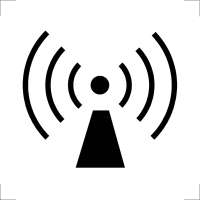
Radio-frequency transmitting incorporates a transmitter and a receiver that are connected by radio waves, 915MHz (Megahertz). This technology is often used in garage doors, industrial remote controls, home automation systems, and wireless alarms. There is no line of sight needed and the radio waves have a much longer transmission range.
What to consider?
With so many different smart thermometers on the market there can be a lot of confusion about which technology is right for you. We have compiled some points to consider when making your next thermometer purchase.
| Connection | Pros | Cons |
|---|---|---|
| Bluetooth | Connects to phone or tablet Can be used outdoors and away from in home Wi-Fi Has a high-tech look and feel Programable features |
Range is short, thirty feet usually Connection and pairing issues create frustration Bluetooth is disrupted by walls, windows, and other hard obstacles Additional drain on phone battery life Signal can be disrupted by other Bluetooth devices |
| Wi-Fi | No range limitations on connection to your phone or computer Allows for seamless integration to the cloud and data storage Programable features |
Price If you are cooking outside or out of range of Wi-Fi you cannot use the technology Drain on battery life Loss of Wi-Fi signal means loss of connection to the device |
| RF | Long range, up to five hundred feet Signal is not interrupted by obstacles and other appliances Connection is dependable and consistent Low battery usage for each device |
Limited Features Older technology that is not synchronized to your phone or tablet Not connected to a data network |
The top selling meat thermometers out there today take advantage of our desires for the newest technology. The caveat is that as we add technology and features to our thermometers, the more likely we are to experience a failure in one of those systems. This issue is seen in connectivity issues, battery life, and signal reliability.
The purpose of a wireless meat thermometer is to give the cook the ability to step away from the grill, oven, or smoker, and do other activities. Using an app on your phone can be fun, but the lack of reliability can quickly turn a fun activity into a frustrating cooking experience.
Top Selling Wireless Thermometers
When looking at the top selling thermometers in the market there are brands that are tried and true (that are known for outstanding quality and longevity), and newcomers with bold new concepts.
MEATER
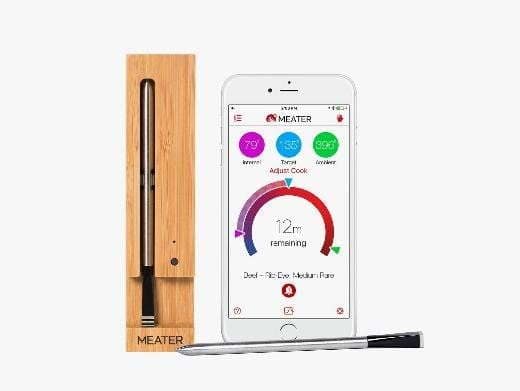
The MEATER Bluetooth thermometer is one of the newest players in the game and developed a name for themselves with an interactive app, data logs, and an innovative wireless thermometer. The probe contains two thermometers in one, with a temperature sensor at one end and an ambient temperature sensor at the other. These relay information back to your phone or tablet allowing you to monitor your cook, set alarms, and even chart the progress of your meat.
With all this technology there are some drawbacks. After our own testing and listening to other customers reviews, we can categorize most complaints into three camps: connection, battery life, and durability.
Bluetooth connection struggles with obstacles like oven and smoker doors. This means that the signal is drastically shortened, and many cooks had to be within ten feet of the thermometer to retain a consistent signal. We also experienced lack of consistent signal through long cooks, often losing connection and having to work to reconnect the system manually. This lack of reliable signal also tended to create fluctuations in temperature readings as the thermometer would try to reconnect with our phone.
Being completely wireless we found issues keeping the probes fully charged, and even losing power over long cook times. Many customers also reporting charging, battery, and battery life issues when using the MEATER.
Durability of your probes is one of the key features of any wireless thermometer. The MEATER has a lower safe temperature range than most wireless thermometers. The internal sensor can be damaged beyond 212°F (100°C), and the ambient sensor at 527°F (275°C). This limits the probes use to cooler temperatures for smoking and slow roasting. The probe can be easily damaged by searing or high heat roasting.
ChefsTemp Quad XPro
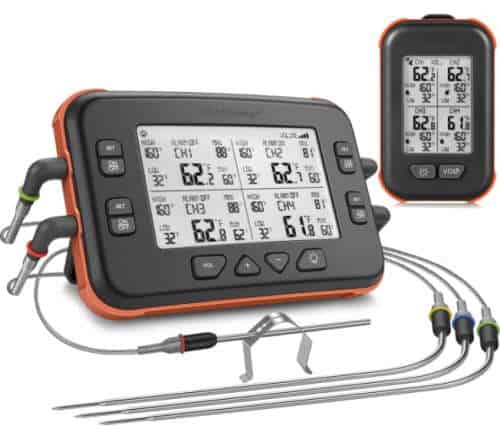
The ChefsTemp Quad XPro utilizes RF transmissions, four individual probe thermometers, a dashboard style display with Hi/Low and Min/Max temperatures, and a separate long-range remote. The main hub is built splashproof and designed for rugged outdoor use. The large dashboard display allows you to see all your probes at once with individual alarms for each probe.
The device itself is incredibly intuitive and simple to use. There are some features that are missing to the modern grill enthusiast such as app integration, smartphone connectivity, and automatic data logging.
What this thermometer lacks in smart integration it makes up for in reliability, accuracy, and connectivity. The RF transmitter can reach over five hundred feet and is not impeded by walls or other solid structures. The probes also are much sturdier and can withstand the intensity of the grill, oven, or smoker not to mention deep fryer, candy making, homebrewing and even sous vide.
| ChefsTemp Quad XPro Cooking Probe and Ambient Temperature Probe | |
|---|---|
| Probe | 527 F (300 C) |
| Cable | 700 F (370 C) |
| Transition | 644 F (340 C) |
Thermoworks Smoke X4 Long Range Remote BBQ Alarm
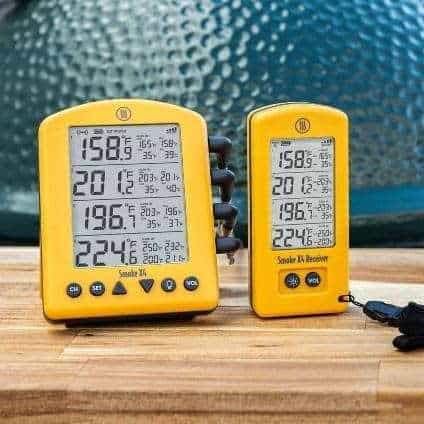
The Smoke X4 is produced by one of the most trusted names in thermometers, known for quality and accuracy. This device is small, easy to read and extremely accurate. The dashboard style display is smaller than the ChefsTemp Quad XPro, but still has four easy to read temperature displays with Min/Max, High/Low displays. This allows you to see the crucial details of your cook at a moments glance vs trying to scroll between screens to find the information you need. The case is splash-proof and sealed for outdoor use, with a steady base and magnetic back to help hold it in place while in use.
The Smoke X4 also incorporates RF transmissions and advertises a line-of-sight range of over 6500 feet. We never pushed it that far, but we did walk around the block without losing signal, can’t do that with a Bluetooth thermometer.
The probes are also similar in construction to the ChefsTemp Quad XPro, with a high temperature range suitable for any number of cooking applications.
| Thermoworks Smoke X4 Cooking Probe | |
|---|---|
| Probe | -58 to 527 F (-50 to 300 C |
| Cable | 700 F (370 C) |
Conclusion
When it comes to wireless meat thermometers the market is full of options to choose from. Which one you decided on will depend on your needs and the style of cooking you will most often be using. Remember to look past the fancy accessories, apps and smart technology and look for reliability. The main factors to consider when purchasing a wireless meat thermometer are range, durability, and connectivity. Happy cooking!
3 Comments
Comments are closed.
Discover Other ChefsTemp Products
Discover more recipes and learn kitchen tricks by joining our cooking family on Facebook.
You may also like:
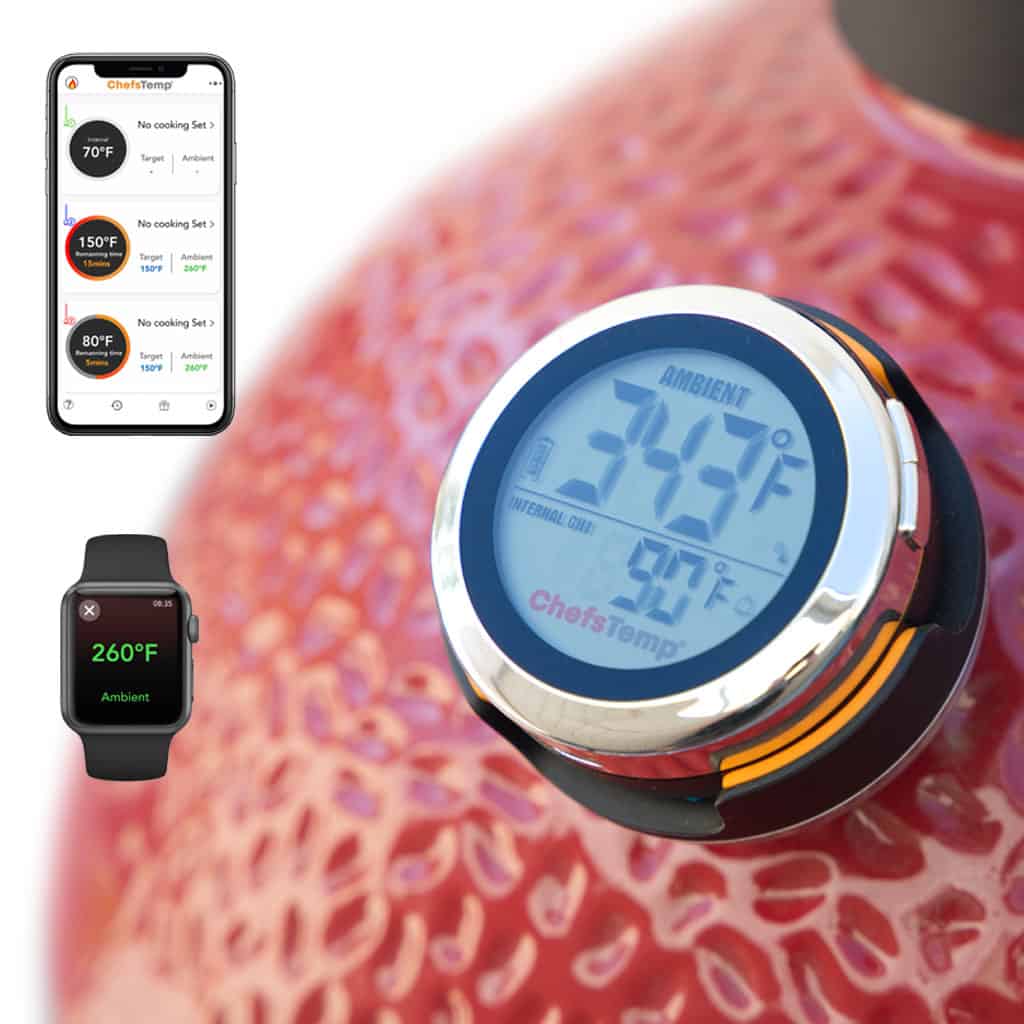
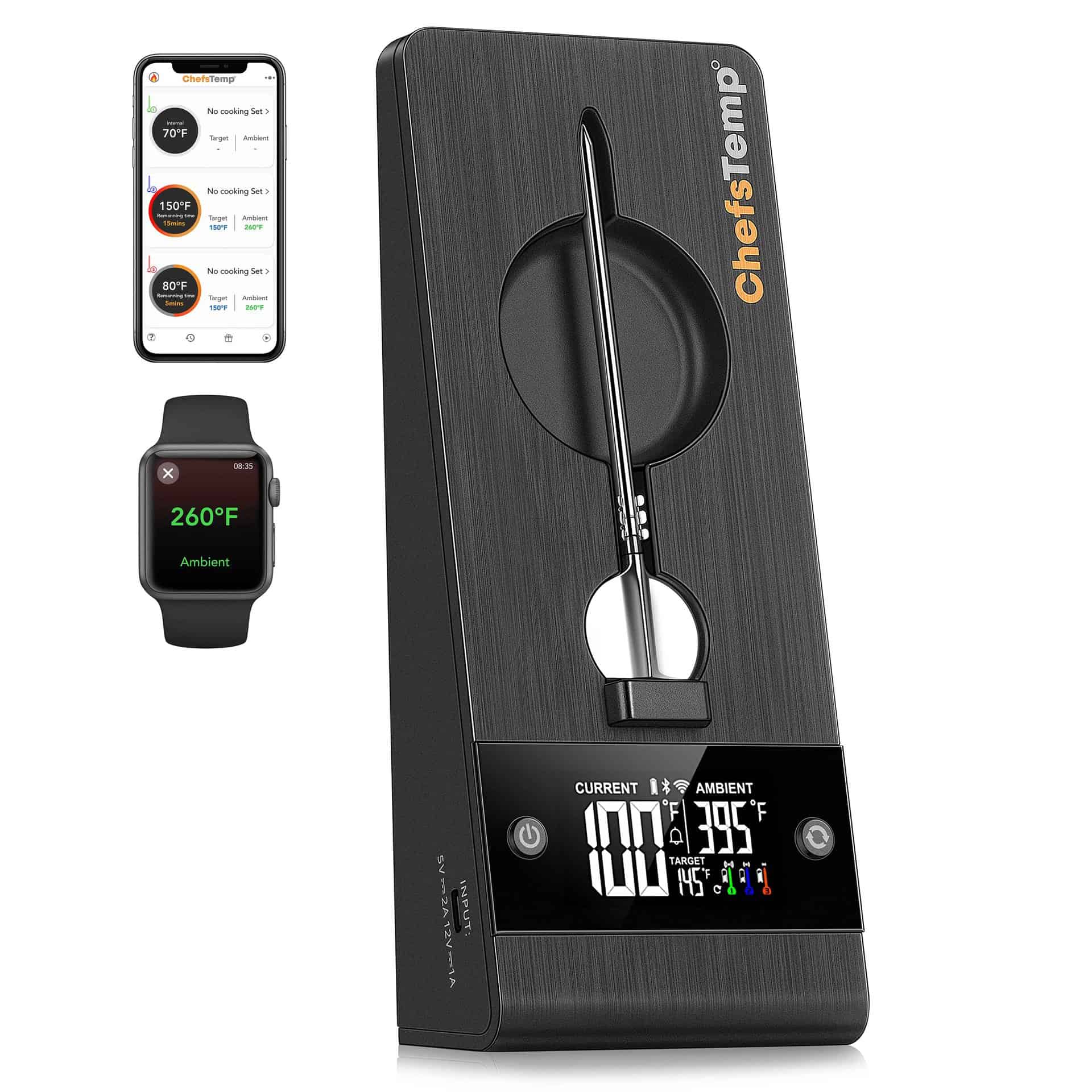
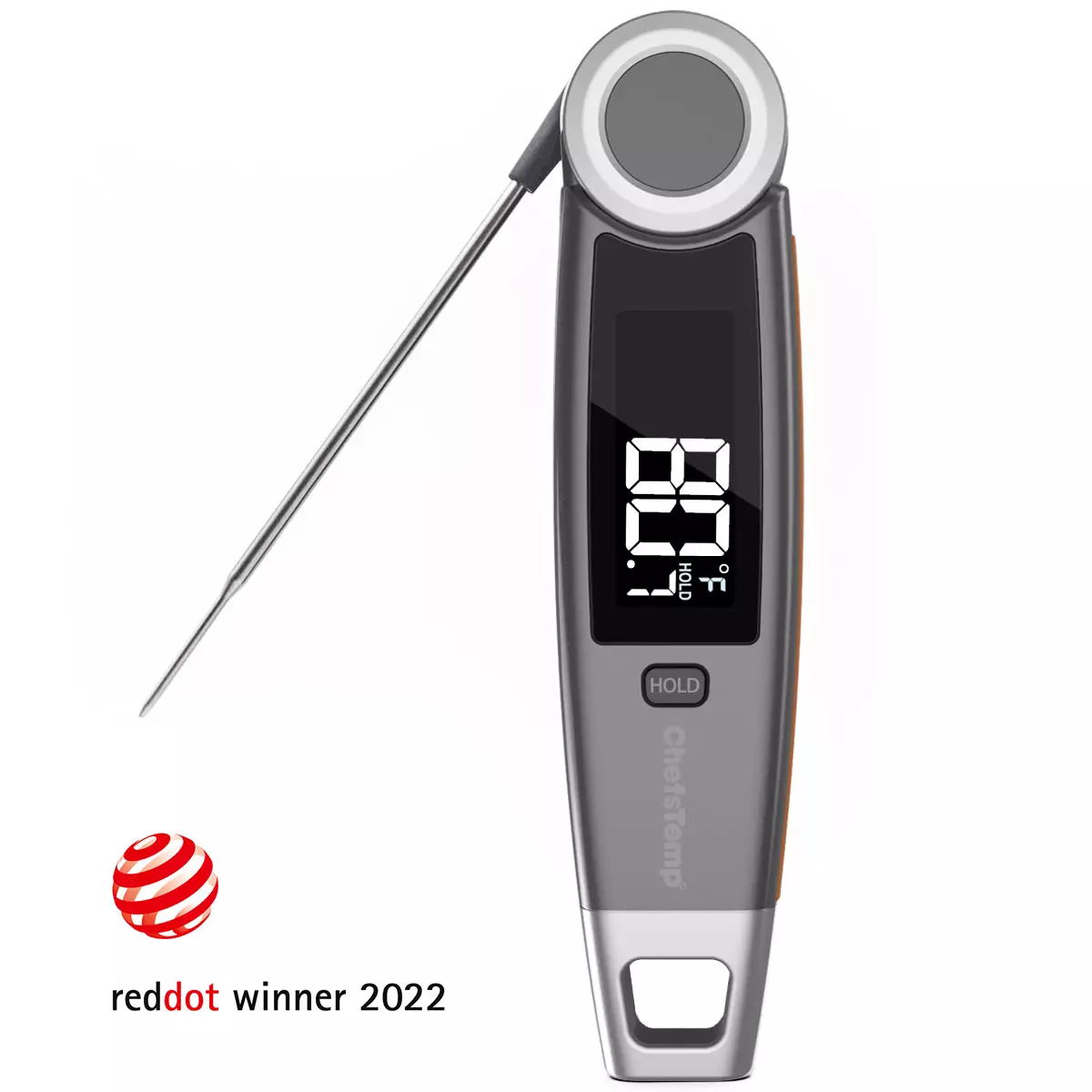




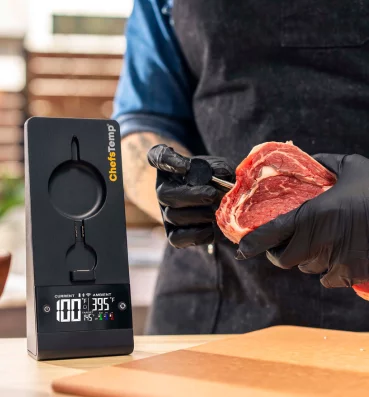


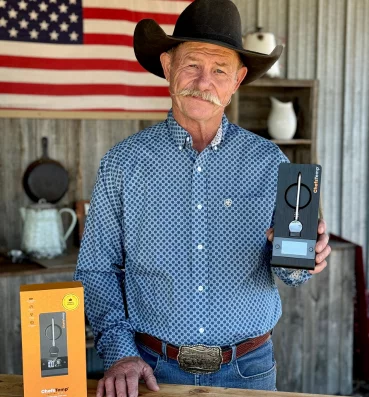
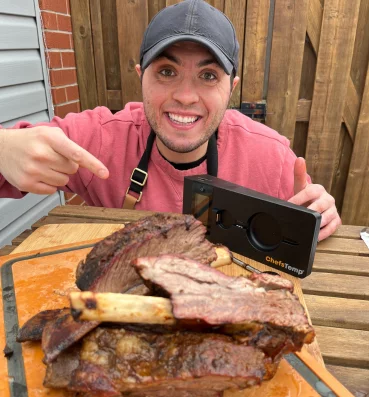
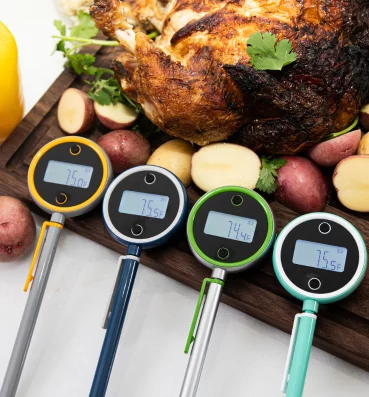
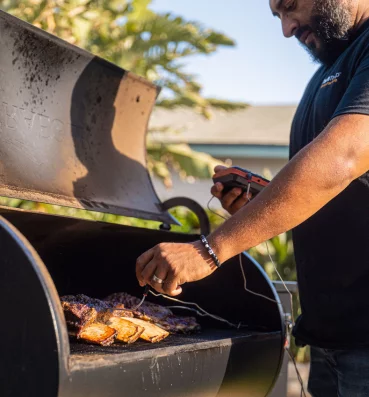
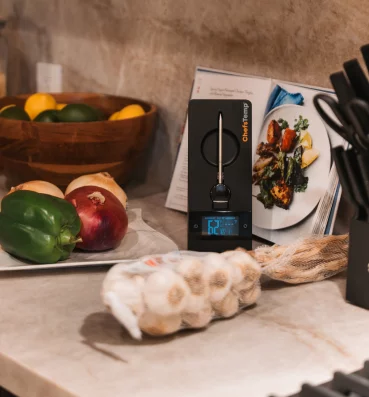

[…] the thermometer: Once you are done cooking, do not forget to clean the probe and the stem of the meat thermometer before storing […]
[…] sufficiently, and evenly cooked. Knowing the key factors to consider when shopping for your kitchen thermometer can help you choose the best model you require for your […]
[…] way. If you do not know how to do the exercise, call the manufacturer for help. To ensure that the instant read meat thermometer works properly after calibration, do not expose it to extreme heat it cannot handle. If you do it, […]